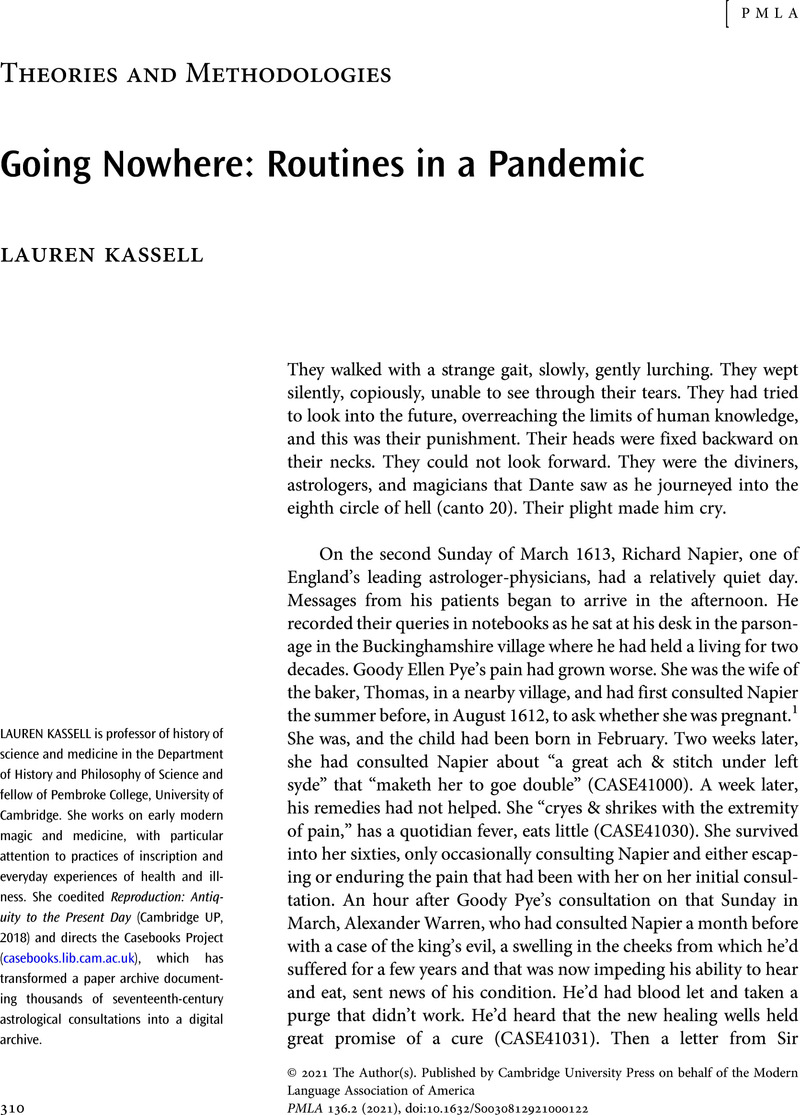No CrossRef data available.
Article contents
Going Nowhere: Routines in a Pandemic
Published online by Cambridge University Press: 16 April 2021
Abstract
An abstract is not available for this content so a preview has been provided. Please use the Get access link above for information on how to access this content.

Information
- Type
- Theories and Methodologies
- Information
- Copyright
- Copyright © 2021 The Author(s). Published by Cambridge University Press on behalf of the Modern Language Association of America
References
Works Cited
“A Bibliography of Historians’ Responses to COVID-19.” American wHistorical Association, 2020, www.historians.org/news-and-advocacy/everything-has-a-history/a-bibliography-of-historians-responses-to-covid-19.Google Scholar
Caduff, Carlo. “What Went Wrong: Corona and the World after the Full Stop.” Medical Anthropology Quarterly, 21 July 2020, anthrosource.onlinelibrary.wiley.com/doi/10.1111/maq.12599.Google Scholar
Caduff, Carlo, and Bonilla, Yarimar. “Covid, Twitter, and Critique: An Interview with Carlo Caduff.” American Anthropologist, 2 July 2020, www.americananthropologist.org/2020/07/02/covid-twitter-and-critique-an-interview-with-carlo-caduff/.Google Scholar
Callard, Felicity. “Very, Very Mild: Covid-19 Symptoms and Illness Classification.” Somatosphere, 8 May 2020, somatosphere.net/2020/mild-covid.html/.Google Scholar
Callard, Felicity (@felicitycallard). “You're sick. and you're still sick. But now you're longer so weak that you can sometimes leave the bedroom, that silent room with the blue outside, far far away, you're in this strange painful dance with the one you love who cares for you, who's cared for you for days #COVID19 1/.” Twitter, 30 Mar. 2020, 4:05 a.m., twitter.com/felicitycallard/status/1244536329129660418.Google Scholar
Callard, Felicity (@felicitycallard). “Your friend @literati sent you another message of love, saying how hard it must be to be in the throes of this virus without medical let alone narrative anchors. The phrase caught you up short. Tens of thousands of people simultaneously stitching signs together #medhums 9/.” Twitter, 17 Apr. 2020, 7:07 a.m., twitter.com/felicitycallard/status/1251105115186122754.Google Scholar
Alighieri, Dante. The Divine Comedy: The Vision of Paradise, Purgatory, and Hell. Translated by H. F. Cary. Project Gutenberg, 2005, www.gutenberg.org/files/8800/8800-h/8800-h.htm.Google Scholar
Daston, Lorraine. “Ground-Zero Empiricism.” Critical Inquiry, 10 Apr. 2020, critinq.wordpress.com/2020/04/10/ground-zero-empiricism/.Google Scholar
Fissell, Mary E. “From Bubonic Plague to Covid-19.” The Washington Post, 7 May 2020, www.washingtonpost.com/outlook/2020/05/07/coronavirus-bubonic-plague-london/.Google Scholar
Greene, Jeremy A., and Vargha, Dora. “How Epidemics End.” Boston Review, 30 June 2020, bostonreview.net/science-nature/jeremy-greene-dora-vargha-how-epidemics-end.Google Scholar
Jones, David S. “History in Crisis—Lessons for Covid-19.” New England Journal of Medicine, 12 Mar. 2020, www.nejm.org/doi/full/10.1056/NEJMp2004361.Google Scholar
Kassell, Lauren, et al. , editors. The Casebooks of Simon Forman and Richard Napier, 1596–1634: A Digital Edition. University of Cambridge, 2018, casebooks.lib.cam.ac.uk.Google Scholar
Kolata, Gina. “How Pandemics End.” The New York Times, 10 May 2020, www.nytimes.com/2020/05/10/health/coronavirus-plague-pandemic-history.html.Google Scholar
Lachenal, Guillaume, and Thomas, Gaëtan. “COVID-19: When History Has No Lessons.” History Workshop, 30 Mar. 2020, www.historyworkshop.org.uk/covid-19-when-history-has-no-lessons/.Google Scholar
Marcus, Hannah. “What the Plague Can Teach Us about the Coronavirus.” The New York Times, 1 Mar. 2020, www.nytimes.com/2020/03/01/opinion/coronavirus-italy.html.Google Scholar
Wright, Lawrence. “How Pandemics Wreak Havoc—and Open Minds.” The New Yorker, 20 July 2020, www.newyorker.com/magazine/2020/07/20/how-pandemics-wreak-havoc-and-open-minds.Google Scholar

